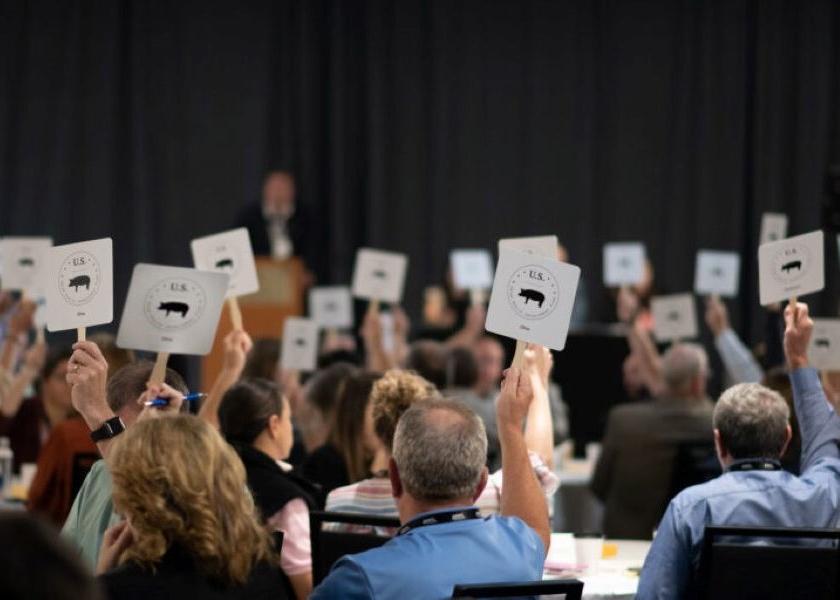US SHIP Delegates Elect First General Conference Committee

Nearly 300 U.S. Swine Health Improvement Plan (US SHIP) stakeholders including producers, veterinarians, state animal health officials, state pork association officials and USDA personnel discussed and approved program standards and resolutions that further clarify and define the requirements of a national certification program for safeguarding and protecting swine health during its third-annual House of Delegates meeting in Bloomington, Minn.
Among the many topics of business discussed, delegates voted on the first elected General Conference Committee (GCC) that will serve as the federal advisory committee to USDA Animal Plant Health Inspection Service (APHIS) and the U.S. Secretary of Agriculture on matters relating to swine health and the administration of US SHIP upon codification to a USDA program.
Six regional and three at-large representatives were elected to their first terms on the GCC. The GCC members represent the points of view of all types of swine producers, livestock marketing operations, and harvest facilities. Newly elected members include: Don Davidson, DVM, Cooper Farms; Howard (AV) Roth of Roth Feeder Pig, Inc.; Mike Walker of Christensen Farms; Mike Paustian of Paustian Enterprises; Mary Battrell, DVM, Smithfield Foods; Christine Mainquist-Whigham, DVM, Pillen Family Farms/DNA Genetics Nucleus; Ryan Pudenz of Prestage Farms; Katherine Stack of Wholestone Farms; and Jesse Heimer of Heimer Hampshires.
“I am very encouraged by the number of individuals that were nominated and that those individuals were willing to run for the GCC elections at this year’s House of Delegates. The delegates have elected an excellent set of representatives to help be stewards for US SHIP. Each of the elected GCC members will play a critical role as US SHIP transitions from a pilot program towards a codified USDA program,” Mike Walker, Chairman of Interim GCC, said in a US SHIP release.
US SHIP is an industry, state and federal partnership for improving preparedness across the U.S. pork industry. Based on producer-developed technical standards, US SHIP participants achieve African Swine Fever (ASF)/Classical Swine Fever (CSF) Monitored Certification, allowing certified sites to demonstrate freedom of disease outside of control areas in support of animal health, commerce and trade, US SHIP explained.
Tyler Holck, senior program coordinator for US SHIP, said enrollment has exceeded 68% of the U.S. breeding pig herd and 61% of the U.S. growing pig herd.
“The rapid adoption by swine producers is very encouraging, especially given that US SHIP was started less than three years ago,” Holck said in a release. “The high level of engagement by all facets of our industry speaks to the potential value of a health certification program similar to what the poultry industry has had for 88 years.”
From traceability, surveillance and feed biosafety to site biosecurity, feral pig risk mitigation and live-haul sanitation, speakers and delegates representing 30 states discussed critical topics of importance. US SHIP's purpose is to mitigate risks of disease introduction and provide a practical means for demonstrating evidence of freedom of disease (outside of foreign animal disease control areas). This supports ongoing interstate commerce and a pathway towards the resumption of international trade in the event of a foreign animal disease outbreak, the release said.
Voting delegates approved five program standards that bring formality to the technical subcommittees and delegate voting processes, clarify minimally required information for movement records and incorporate the current USDA African Swine Fever/Classical Swine Fever (ASF/CSF) active surveillance program, the release said.
In addition, five resolutions were passed that direct:
- further assessment of repositories for movement records to strengthen national traceability standards
- the integration of a feral pig mitigation plan into Secure Pork Supply Plans
- the establishment of an exhibition swine working group
- further exploration of a site status verification database
- further processes around incorporation of the USDA ASF/CSF active surveillance program.
Working groups and/or pilot projects will begin soon with findings and recommendations to be presented at the 2024 US SHIP House of Delegates meeting. Support is provided by USDA, National Pork Board and National Pork Producers Council.
Participation in US SHIP is for all pork producers and pig owners no matter their size—from large production and packing facilities to small farms and show pig owners. Enrollment in US SHIP is simple and easy. Access enrollment information on the website: www.usswinehealthimprovement.com.







